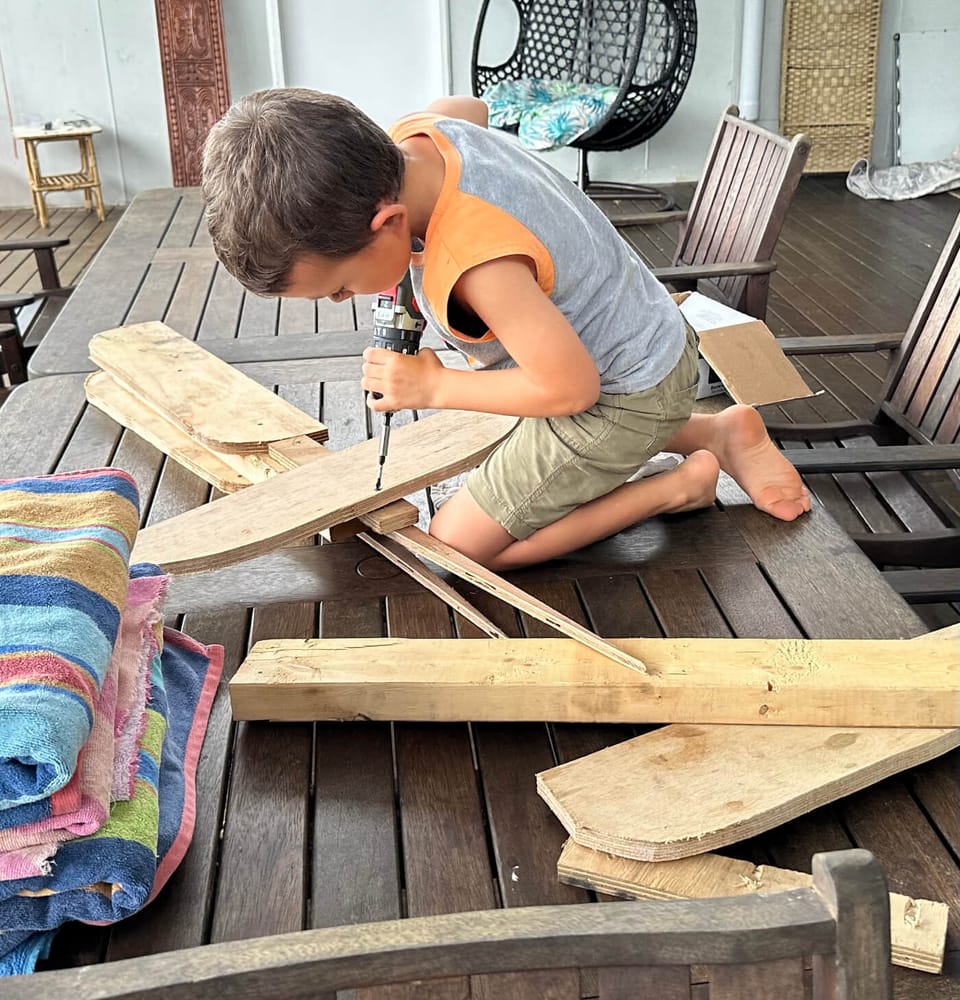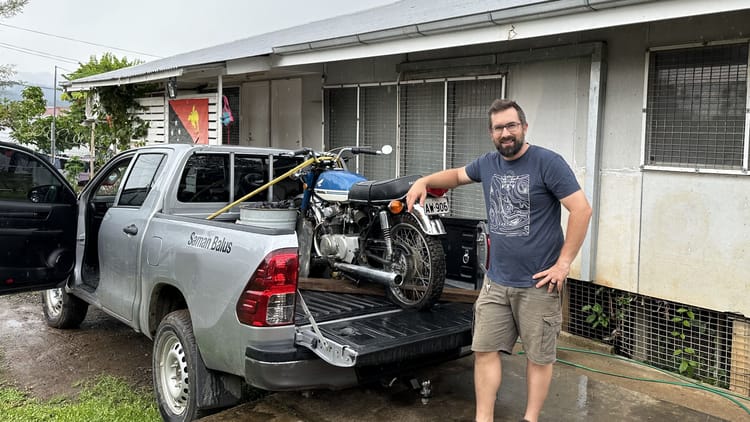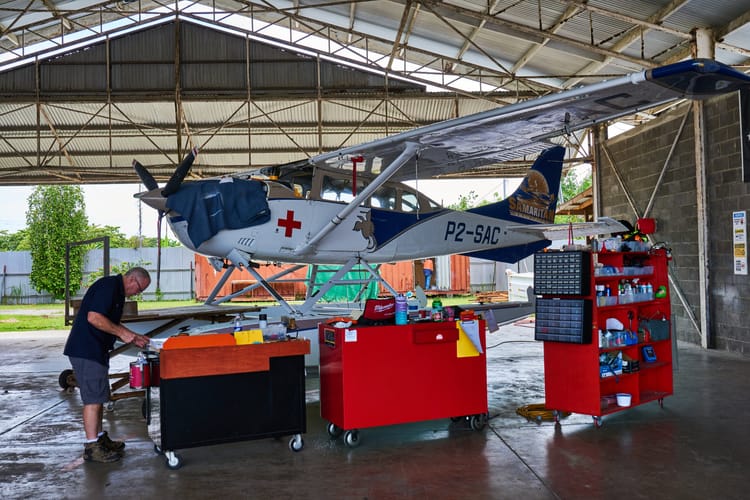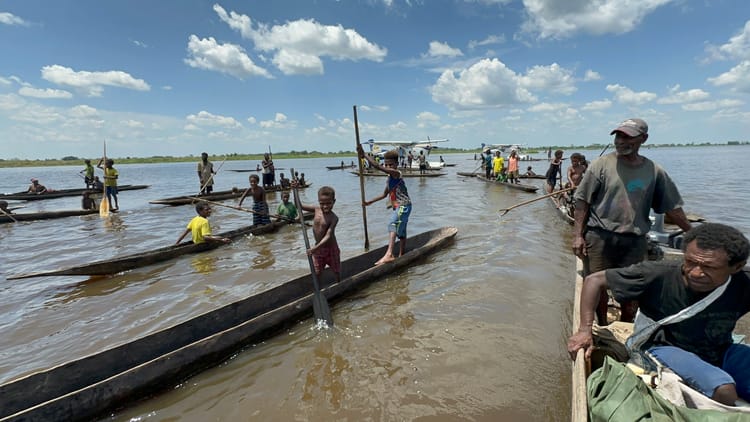Phantom Potholes & Life Lessons

Being Interesting
I try not to be boring. It does happen at times, especially when I’m telling someone a story and I spend fifteen minutes describing details that don’t really matter. Still, I’m not bored, even if my audience is.
Because I didn’t want to be boring, I resolved to write about only interesting things. I soon found I had inadvertently decided to not write about a large majority of our lives. So I unceremoniously marched that idea behind the barn and shot it, which may seem cruel but it’s far less so than letting it die slowly from neglect. Our lives are what they are, interesting or not.
Sickness
First, I feel a need to update everyone on sickness. It seems that everyone has been asking my sister-in-law, Erleen, who came and visited us here in PNG a month or two ago and has since traveled to the States, if we’re still sick. At the risk of hurting our image as suffering missionary martyrs, we’re actually doing fine, as of late. I know, that’s not very interesting but it’s true.
Well, not quite true. I’m still getting these little blisters all over my head.
For awhile I thought it was some sort of bacterial infection. I used tubes of antibacterial ointments and took several rounds of antibiotics I still can’t pronounce. It didn’t really help. I began boiling my pillowcases, my towels, my hats, and anything else that touched my head. If you wandered into our kitchen on any given day, you’d be surprised to find a boiling cauldron of pillowcases on our stove. Or maybe boiling pillowcases is more common than I realize. Still, the blisters continued marching around my head, appearing in as little as few hours then sticking around like an issue of “Reader’s Digest” at your grandma’s house. They began piling up and having little traffic jams on my face. It’s been going on for months.
I was desperate. I began to think outside the box. What could be causing this?
Freddy the Carver
I had purchased several large, carved wooden carved masks from Freddy the carver and hung them on the wall for some PNG flair. Janice put up with my interior decorating but wasn’t entirely enthused about it. I soon heard stories of how carved masks are used in animistic worship and how some other folks had strange things happen when they had masks around the house. I don’t like to give the devil too much power, and yet I admit he’s nothing to mess around with. So, as I came out from the bathroom everyday covered in antibiotic goo, I couldn’t help but think, “maybe if I took those off the wall…”
Now since Freddy the carver sold me the masks, I knew they were never used in worship, except maybe the worship of money. They were brand new, shiny with lacquer, and were made for the sole purpose of selling to white people. I initially thought he carved all his goods himself because he told me he did. But as time went on, other wood carvers showed up to sell me goods (somehow they knew where I lived) and I began to notice they all sold the same things. Not only that, but the style of carving changed month from month. I also began to get tired of Freddy. His sales tactic was to pester me until I bought something. The arrangement seemed to be that if I bought something he would disappear for a month, which I thought was a fine use of a couple Kina. Then a purchase was only good for a week. Then he began showing up several times a week. Then he showed up once and just asked for money without exchanging any goods at all. And since I was stockpiling carvings under our bed to take back to the States as gifts to supporters, wooden crocodiles would roll out from under the bed every time Janice put sheets on it. She began to drop subtle hints that we had enough carved trinkets. I began saying no to Freddy. Our relationship soured a bit since then.
Still, I thought masks were cool and they are definitely a unique PNG item. But one day I had enough of the weird bumps marching around my face and so I took the masks off the wall, as kind of a scientific experiment. But how far away must the masks go before I’m out of their range? I figured the storage unit on base (which is really just an old water tank) was far enough away. Sadly, days went by and nothing seemed to change.
So it wasn’t spiritual and it didn’t seem bacterial. What else was it? A missionary friend in Zambia who is a nurse took my case to her friend in some other country who is a dermatologist and he gave an informal diagnosis that it’s some rare autoimmune condition, similar to eczema, where your body’s immune system is misbehaving. The diagnosis was actually kind of interesting. I took some more medicine that seemed to help, until I stopped taking it because apparently you can’t take it forever. And so the condition persists. I blame stress.
Airplane Mechanics
The main source of my stress are airplanes. I don’t write about airplanes that much because most people don’t find it that interesting.
Also, airplane mechanics are a judgmental bunch.
Oh, don’t misunderstand. They aren’t typically judgmental about moral issues. In fact, sometimes I think they may be the lowest on the totem pole in that regard. That’s because working on these old oil slicks can bring out the worst in anybody. Pilots spend their time being closer to God, soaring among the clouds. Mechanics, well, we spend our time trying to keep the pilots from meeting God, all the while dealing with the devil’s handiwork; mainly cracks, corrosion, and decay. Sometimes the decay is obvious but just in case it’s not, we’re required to inspect the airplanes every so often and if we find any, we have to figure out if it’s enough to worry about. And every time we decide it is something to worry about, we have people whining to us about it. Accountants complain about how much we’re spending. Pilots whine about how little we’re spending (make the airplane nice!). Dispatchers say we’re not working fast enough and our wives demand we work less. So when we bust our knuckles on something, we can cauterize the wound with the heat coming from our mouths. All this may lead you to believe we don’t like our jobs, but we do actually. Sure, sometimes you have to peel back several layers of dirt and grime to find that spark of joy. And yes, we’re just a little insecure about our work at times so we like to make ourselves feel better by criticizing everyone’s repairs but are own.
“What ape put this patch in?”
“This filing job looks like a neanderthal was chewing on it.”
“What half-wit put pull-rivets in here when you could easily drive solid rivets? The lazy slob!”
“Hey, someone left a flashlight in the wing! Haha! Oh wait. This is mine.”
“It looks like someone drilled these holes with a screwdriver! Ha!”
Sometimes we do pull off the perfect repair and then act all modest and humble and pretend our standards still exceed it by a good margin. This is why I don’t like to be too specific about anything I’m doing. There are too many mechanics eager to beat some poor soul over the head with obscure data, or the latest revision of a thick service manual, or the questionable advice they got from a grizzled old mechanic who disregarded all of those things and got away with it.
I find fixing planes is like raising children. Some days you’re embarrassed to admit they are your handiwork but then, when they do something extraordinary, you’re quick to claim they’re yours, and you actually claim much of the credit for their good character.
The planes are just like that. They all have their character flaws and strange talents. Some days I’m restraining myself from beating them with a wrench. But lately they’ve been doing good. We’ve been bringing in a lot of patients the last couple days. Monday we had three snake bite victims! We couldn’t pick them up fast enough. I don’t know if snakes are more active at certain times of the year or if people are out in the gardens more, but it seems like snake bites come and go in a seasonal fashion. Then Tuesday we had three more flights. We were loading up one plane with medicine while the other one was dropping off patients, fueling, turning around, and flying out to pick up another. I consider myself a proud parent, or foster parent, at least, of two Cessnas. The third Cessna, well, it’s a work in progress.
Pothole Update
There’s a lot of work in progress around here. Previously I reported on the potholes around here and how people would fill them with sand right before it rained. This means they weren’t full of sand very long. I often suggested, to anyone within hearing distance, that they should fill them with cement instead. This tirade was usually triggered when my head ponged off a pointy piece of interior trim. THUMP. “OW! Man, someone should fill those holes with cement. They have cement here, why not use cement? Cement isn’t expensive. USE CEMENT!” I’d yell out the window. I suggested it so often that Janice, who usually sighs enthusiastically every time I have an idea, began just rolling her eyes. To be fair, it could have been the whiplash that was making her eyes sling around their sockets.
THUMP! “OW! Why don’t you just drive around the big holes?” She would ask. That’s easier than it sounds since the holes are placed in such a way that a ballerina couldn’t tiptoe between them. Still, a couple times I put the van on its tiptoes and tried doing it anyway.
The holes can wreak havoc on your depth perception. One can look small in diameter and innocent enough, but it’s not until your wheel falls into it that you realize it’s actually an abandoned mining tunnel and your wheel is now spelunking somewhere below the earth’s surface. Some time later, when the car has traveled an astonishing distance past the hole, your wheel will return to the chassis, all roughed up and looking like it insulted a motorcycle gang. This can cause considerable pain to any mechanics who witness the event, particularly if they’re in the vehicle.
So it was with great and distinct pleasure when one day I noticed a crew of people wearing reflective vests filling in the holes with cement. Maybe someone heard me yelling about it.
But, just like someone who loses a limb but still feels pain in that limb for a long time after it’s removed, the people of Wewak found themselves swerving around phantom potholes that were no longer there. One time a guy who was driving towards me suddenly shot into my lane, which surprised me considerably even though it happens all the time, and stood his car on its tiptoes so he could squeeze past a large hole that was no longer there. I’m sure the phenomena will fade after some time.
Espresso Makers
I often wanted to stop and give the road crews a Coke, or an espresso for that matter. I just never had an espresso or Coke with me, which is surprising because I’ve been making espressos a lot lately. I hate to admit this because it will hurt our martyr missionary image, but we’ve purchased an espresso maker. Will it help if I said we bought it used? We bought it from a family from Holland. I would give you their names but I can’t really spell them. They use a lot of consonants and not enough vowels. Despite that, we had become good friends with this family, especially since they had three boys about the same ages as our kids, and an espresso maker. I’ve found that the silver lining to saying goodbye to your friends who are leaving the mission field is buying their stuff.
Oh, but we don’t just keep the blessings of an espresso machine to ourselves. We hire a security company to provide us with a night guard that comes and, in theory at least, stays up all night patrolling our compound. There’s always different guards rotating through. Micheal is one of the guards who has been here a lot lately. One night he asked me for some coffee. The strange thing is that PNG is known for its coffee but locals don’t really drink the real stuff. I’ve found the standard cup of coffee is prepared something like this: They take a pack of 3-in-1 (3-in-1 is instant coffee, sugar, and powdered milk) and pour half of the pack into a cup of hot water. Then they add sugar and drink it, leaving half the pack to enjoy later. Well, knowing that Micheal may have never had espresso before, and knowing that the nights are awfully long and lonely, I assumed Micheal would make quick friends with stout cup of espresso. I was right. He was very grateful for its company.
The next day, around 5 pm or so, he showed up for his shift and was a bit unhappy. “I didn’t sleep at all since I drank your coffee,” he said. “I don’t want anymore of your coffee.” I laughed heartily, sharing in his misery. That night I gave him a pack of 3-in-1. With any luck he could get some sleep.
Big Lessons
Unfortunately, there isn’t any coffee strong enough to wake the dead. Part of learning about a new culture is learning their customs and traditions. When we first arrived in Wewak, we were greeted by a crowd of people with their faces against the airport fence all wailing and sobbing loudly. We were a bit taken aback. If they felt this strongly about us coming, maybe we should turn around and leave. Later we found out there were bringing back a body on our flight and that is how the friends and family of the deceased traditionally greet the coffin when it arrives.
I feel like death in the States is very sanitized. Here, there is no embalming so everything happens fast because bodies, well, they get nasty pretty fast. I’ve heard stories of bodies being brought back to their village with liquids seeping out of the coffins. In the States, the government would show up in hazmat suits and declare some sort of environmental disaster took place. Here, it’s part of the process.
Adi has a good friend named Shay. Shay’s family is from a local community not far from Wewak. Her mom, Eva, worked for a local mission for many years and so her daughter, Shay knows English really well. This helped establish a level of friendship that Adi doesn’t have with other local kids. A few weeks ago, Eva fell ill from meningitis (probably caused from TB) and lapsed into a coma. After several days of fighting for her life, Eva passed away, leaving a hole in the local mission community and Shay without a mother. Shay will likely go back to her mother’s village to be raised by her grandparents. It was hard for Adi seeing Shay go through such a traumatic event and it’s hard for her to lose a friend. It’s hard for all of us since Shay, who is such a sweet little girl, now faces such an uncertain future. Still, good things can come out of bad, and Adi and Janice had a chance one night when Adi was working through some emotions to talk about death, how to grieve with your friends, and how God can give us strength to get through it all. These are all good lessons but lessons no one looks forward to learning.
Little Lessons
Elliot’s first lesson in manhood was how to fill up a car with gas. A gas station cashier later told me that it is illegal to teach a boy who’s not 16 years old to do that. That was lesson two in manhood: sometimes the government stands in the way of progress. Recently I gave Elliot another lesson in manhood: How to use a drill. Janice was the one to blame, really.
“Every boy should know how to use a hammer,” she said one day.
“Sure, why not show him how to use a chainsaw too?” I asked. “Are you listening to yourself?”
“It teaches hand-eye coordination and besides, it would get him out of the house for awhile.”
“Ah.” I said.
So one Saturday I was headed to the hangar to work on the lube cart. The lube cart is a cart on which we put all the greases, oils, lubes, safety wire, Scotchbrite, safety glasses, ear muffs, and other frequently used items. The idea is that you simply roll the cart out to your project so you don’t have to walk to the other side of the hangar 1,415 times each day. The only problem was that the lube cart was only half finished and so all the useful stuff didn’t quite fit onto it, and so we had to stash stuff here, there, and everywhere, causing me to walk back and forth across the hangar 1,545 times each day trying to find where we put something. It was the classic case of making something worse by trying to fix it. I took Elliot and Adi along to help me. I couldn’t find any nails and so I showed them how to use the impact gun instead. Elliot took to it like beaver takes to building a dam.
One day later and I found my box of screws open on the back deck, my drill and impact gun look like they’ve been dropped down the steps, and there’s a forty pound pile of lumber scraps screwed together out on the porch. Elliot says it’s a gun. Maybe the next lesson in manhood will be how to start a fire with only a match, several liters of petroleum, and forty pounds of scrap wood. Then again, I’m sure some government bureaucrat has already written a law against it.





